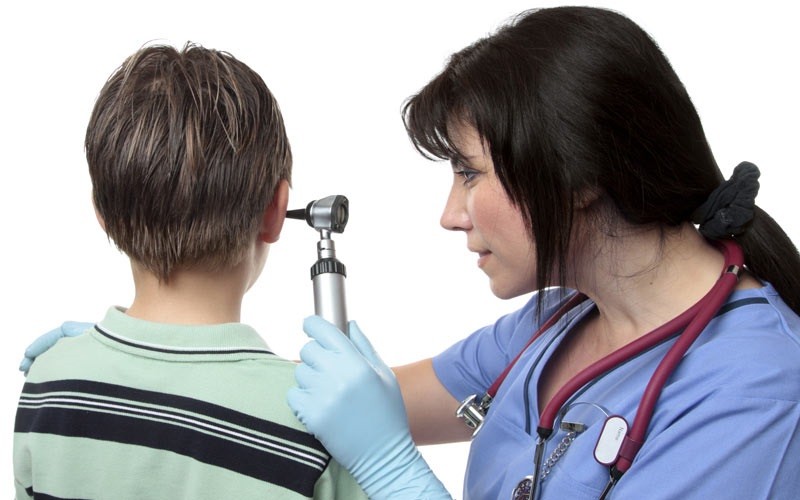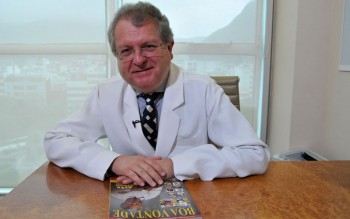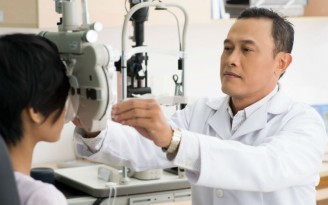
What’s your hearing like?
Otorhinolaryngology: one of the greatest specialists in Brazil talks about looking after the ears.
Leila Marco
Thursday | October 30, 2014 | 10:14 PM | Last update: September 22, 2016, 4:07 PM (Brasilia time)
Buzzing in the ears, hearing loss, dizziness, and pressure in the ears are symptoms that indicate a disease still little known about: Méniere’s disease. Although not adequately divulged the problem needs attention right from the first signs.


At the invitation of GOOD WILL magazine, one of the most renowned and respected otorhinolaryngologists [ear, nose, and throat specialist] in Brazil clarified the main doubts about this pathology. According to Dr. Jair de Carvalho e Castro, Head of the ear, nose, and throat department of the 2ª Enfermaria da Santa Casa da Misericórdia in Rio de Janeiro, Brazil, Méniere’s disease can occur at any age, however, it is most frequent in adults aged 40-50 years, with a slight preponderance in women. In the interview, the doctor also emphasized the care necessary for maintaining a healthy hearing.
GOOD WILL — What is Méniere’s syndrome?
Dr. Jair de Castro — It’s a disease that has been well-recognized since the mid-19th century. It is characterized by four symptoms: hearing loss, ringing in the ears, dizziness, and a feeling of pressure in the ears. This is the classic image of the disease. Sometimes one [symptom] predominates over another; sometimes it’s more deafness or dizziness, more buzzing or pressure, or they are all more or less the same.
GOOD WILL — What situation indicates that it’s time to see a doctor?
Dr. Jair de Castro — If the person experiences an event for a few hours and it disappears—they no longer have it—there’s no need [to go to the doctor]. But, if it is repeated or it persists, it’s worth investigating. We usually draw attention to the ears, both with regard to hearing as well as balance, because this system works like a thermometer of our health. If there’s ringing in the ears, hearing loss, or dizziness, something is probably happening at a distance... Each patient has his or her own characteristics, but the disease is the same.
GOOD WILL — Is there a specific procedure for detecting the disease?
Dr. Jair de Castro — In otorhinolaryngology we have a routine that is very much similar to that in other specialties. We look for details... the time, the incidence, the frequency [of the symptoms reported], the patient’s profession, their age, if they have any health problems, if they use excessive medication, etc. This is all very important to understand what kind of patient one is dealing with. Based on this information, we first of all carry out a physical examination, during which we look at the nose, throat, and ears. The second step is to undertake an investigation by means of complementary testing: audiometry, imitanciometry, electrophysiology of the hearing, and a more specific test for Méniere’s disease, which is called electrocochleography.
GOOD WILL — Does this confirm the diagnosis?
Dr. Jair de Castro — With these examinations we can get a fairly accurate information about how the auditory system is functioning. Depending on these results other tests may possibly be requested, such as basic routine blood tests: a complete blood count, tests for cholesterol, sugar, hormones, etc…. Some patients may also need imaging exams: tomography or magnetic resonance. With this set of information you can already know the patient’s profile. These procedures are carried out in a sequence and as each result arrives it provides us with information that allows us to complete the diagnosis.
GOOD WILL — With the confirmation of the diagnosis, what’s the next step?
Dr. Jair de Castro — First of all, to establish a friendly relationship between doctor and patient. Both in the private clinic as well as in the Santa Casa da Misericórdia of Rio de Janeiro, we explain that it’s a disease... that despite being uncomfortable it is not life-threatening. We give them guidance about the tests carried out, we talk a little about their health, eating habits, and we prescribe medication, depending on each phase of the syndrome. (...) Méniere’s disease has a particular characteristic, but it varies from person to person. So, we need to adjust the dose of the medication. Another very important point relates to the patient’s lifestyle. In addition to reducing the intake of sodium [table salt] and caffeine, we recommend they go no more than three hours without eating.
GOOD WILL — Can Méniere’s syndrome cause total deafness?
Dr. Jair de Castro — It can reach almost total deafness. It causes not only important hearing loss, but also the loss of understanding words. In addition to hearing badly, they don’t understand the words said. Hearing is an extremely important sense; those who have a hearing disability suffer a lot at home, at work, in the street, so they begin to isolate themselves and to refuse family and social invitations... So the message we want to leave is that every person with a hearing disability can be helped. Hearing is fundamental, not only to social, family, or professional life, but equally to the patient’s psychological well-being.
GOOD WILL — What is the appropriate top noise limit for the ears?
Dr. Jair de Castro — It’s between 85 and 90 decibels. Sound should be at a comfortable level. What we’ve observed is that people begin with a comfortable sound level and after some time they increase it, which already shows some degree of hearing loss. This process doesn’t happen from one day to the other. It’s a long process and normally when they seek help they already have some damage that is probably irreversible.
GOOD WILL — So should caring for our hearing start early?
Dr. Jair de Castro — It begins during pregnancy. The mother needs care, prenatal guidance. She should not take medication and antibiotics; not all antibiotics, but those that can damage the auditory system. She must not smoke, drink or use drugs. When the child is born it has to undergo a hearing test, because if it can’t hear it has to be treated. If it’s not diagnosed by the time it’s 24 months old, rehabilitation is extremely difficult. Today we can put a cochlear implant in a child who is born with no hearing at all in order to reestablish its hearing capacity so it can lead a normal life. Our profession is about helping people to live better.
GOOD WILL — What guidance would you give to someone who already has hearing problems?
Dr. Jair de Castro — Get help. You’ll have support, guidance, and you’ll be treated and medicated... you’ll have resources to make your life more agreeable and pleasurable. I think that the objective of life is to really live better, to be integrated with people, with the family, and with the community. Health is a divine gift and that’s why we must look after it.
Version: Rob Dinham
Revision: Rosana Bertolin


